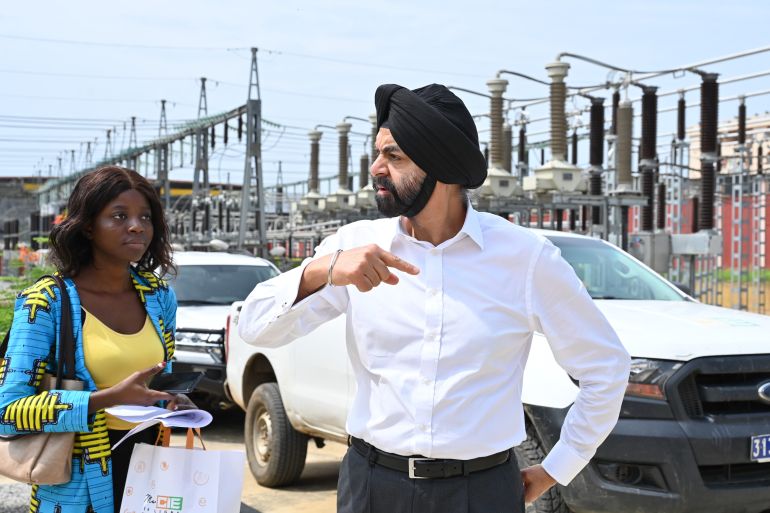Biden’s pick for World Bank president can’t fix its crisis
Instead of curbing poverty, as its mission outlines, the bank entrenches inequality. Its US-led governance is to blame.

The mission of the World Bank is supposed to be to eradicate extreme poverty and promote shared, sustainable prosperity. Yet to many of us, the bank has actually done more to entrench poverty and injustice than any other global institution, including through the conditionalities it imposes on poor nations that need its loans.
One of the reasons for the World Bank’s failure is its archaic governance structure, set up after World War II, at a time when most African and Asian nations had not achieved independence and so had no sovereign voice. Another reason is that its leadership is not recruited through an open global process but rather by a patriarchal “gentleman’s agreement” that allows the president of the United States to unilaterally appoint the bank’s president.
Keep reading
list of 4 itemsIMF, World Bank hold meetings in Morocco weeks after devastating quake
World Bank cuts 2024 global growth forecast as rate hikes bite
World Bank’s new chief asks staff to ‘double down’ on development
Every one of the 12 full-time presidents of the World Bank to date has been a male, US citizen.
This illegitimate arrangement is something ActionAid, a global federation supporting more than 15 million people in nearly 40 countries to live a dignified life free from poverty and oppression, has been challenging, together with others, over the past decade.
This week I have started my new role as secretary-general with ActionAid. Applying for this job involved an intense process which lasted several months but it was what it needed to be — transparent and rigorous.
It is an honour, as well as an important responsibility to be the first Ugandan, the first African, to serve as ActionAid’s permanent secretary-general. In comparison, the recruitment of a new president for the World Bank is opaque and effectively restricted to American citizens.
That pattern appears set to continue, with US President Joe Biden unilaterally nominating former Mastercard CEO Ajay Banga for the post of the bank’s next president. I call on Biden to get with the 21st century and ensure the next World Bank leader is truly the best person for the job. His nomination, sadly, is deeply inappropriate given the huge significance of this role in the world.
The credibility of Banga to make the changes that are needed at the World Bank is fatally compromised by the lack of legitimacy in his appointment. How can he set out a bold new vision to challenge and transform power when his own power as president comes from a distorted process? Banga is a private equity executive with no experience in public service. Indeed, his corporate background reflects the kind of inequality-driving, climate-destroying hyper-capitalism that is everything the World Bank should be standing against if it wants to genuinely aim for ending global poverty.
The World Bank urgently needs new thinking if it is to get on track with its supposed mission. To start, we need a World Bank president who will definitively move away from the climate denialism of the present president, David Malpass. But at a time when we need the World Bank to stand up to the fossil fuel industry, the institution is still busy funding fossil fuels.
We also need someone who will recognise that the climate debt of the Global North cannot be paid to countries profoundly affected by the climate crisis in the form of loans that will lead to further indebtedness. Yet, the climate finance proposals expected to be discussed at the World Bank meetings in April focus precisely on a massive expansion of loans, not grants.
It is time for the World Bank to recognise the scale of the global debt crisis – and to acknowledge that debt is an accelerator of the climate crisis. Indebted countries have to raise dollars – and the easiest way to do that is through extracting fossil fuels and national resources and through export-oriented industrial farming serving the global supply chain. If debt exacerbates the climate crisis, how can more debt be the answer?
We need a president who will chart a new path, away from 40 years of structural adjustment and austerity. Together with the International Monetary Fund, the Word Bank continues to champion cuts and freezes to public sector wage bills. It fails to support the obvious alternative of helping countries to expand their tax revenues in progressive ways in order to sustainably finance front-line public sector workers who are key for achieving the Sustainable Development Goals.
The new president will need to lead the development of a new gender strategy for the World Bank, one that confronts the contradictions between the narrowly targeted work of its gender team and the wider gendered impact of its work enforcing austerity. When public spending is cut, women are triply disadvantaged: the first to lose access to public services, front-line jobs and the first to assume unpaid care work.
The present gender strategy, which runs out this year, is instrumentalist, narrow and largely ineffective. Any new one must be transformative.
In my role as secretary-general of ActionAid, I will be using a feminist lens to fight for system change. The World Bank needs to make a definitive move away from its support for privatisation and public-private partnerships, learning from the mounting evidence of their harm, particularly the exclusion of women and girls that comes from charging fees.
But the bank remains caught up in an ideology that sees public services as the problem, not the solution. If there is little hope for system change from the World Bank and reform is not possible, abolition is the only alternative.
The views expressed in this article are the author’s own and do not necessarily reflect Al Jazeera’s editorial stance.
